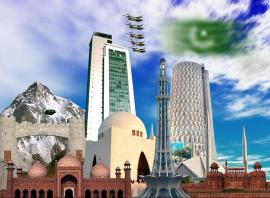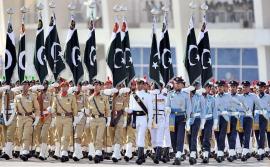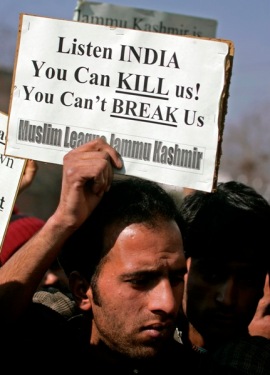Kashmir boils again
July 10, 2010 Leave a comment
The Indian Held Kashmir boils again. Last week, police killed three youth in IHK, and there were protests in the valley over the atrocities committed on Kashmiri youth. Curfew has been clamped in Srinagar to prevent people from holding protest demonstrations against the recent killing of protesters by Indian troops. Reports from Sopore, Baramulla, Kupwara, Handwara, Islamabad, Koimoh, Pulwama and Kakpora towns said that curfew was being strictly enforced and people are suffering because they are unable to buy food and items of daily use due to the curfew. According Kashmir Media Service 33 people have been killed by Indian paramilitary forces’ during the month of June 2010 including four children.
The APHC Chairman, Mirwaiz Umar Farooq in a statement in Srinagar said that no power on earth could stop the Kashmir people from continuing their liberation struggle. He urged the international community to send teams to the occupied territory for taking stock of the situation. Unfortunately, international community turns a blind eye to Indian brutalities highlighted by the Human Rights Watch and other human rights organizations. The ‘champions’ of human rights US and the West give overriding consideration to their commercial interests with plus-one billion market rather than human rights. For the last six decades, Kashmiris are facing death and destruction, and even today young Kashmiris are being killed in fake encounters; women are being raped. And repression and state terrorism have turned Kashmir into a hell that would stretch Dante’s imagination. After facing unprecedented repression for four decades from 1948 to 1988, valiant Kashmiris started armed struggle in 1989 and since then at least 90000 Kashmiris have laid down their lives. However, they are determined to take their struggle to the logical conclusion. There are some parallelism between Kashmir, Palestine and Bosnia so far as genocide of the Muslims is concerned, but the Kashmir dispute is different in a way that it was India that took the Kashmir issue to the UN under Chapter VI of the UN Charter, which deals with Pacific Settlement of Disputes. The Security Council then passed the resolution on January 5, 1949 stating: “The question of the accession of the State of Jammu and Kashmir to India or Pakistan would be decided through the democratic method of a free and impartial plebiscite”. But it was due to apathy of international community that it did not persuade India to implement the UNSC resolution. Nevertheless, the issue is alive in the UN records, and unless it is resolved there cannot be a durable peace in the region.
However, European countries sometimes do raise the issue of human rights violations in Indian Held Kashmir. In 2008, the European Parliament had debated on mass graves in Indian Held Kashmir during the plenary session of European Parliament in Strasbourg, France. And passed the resolution which reads: “Hundreds of unidentified graves have been discovered since 2006 in Jammu and Kashmir and human rights violations committed by the armed forces of India continue in an atmosphere of impunity”. It called upon the Indian government “to urgently ensure independent and impartial investigations into all suspected sites of mass graves in Jammu and Kashmir and as an immediate first step to secure the grave sites in order to preserve the evidence.” Hundreds of unnamed graves were already discovered by a human rights group in Kashmir recently. Most of those buried in the graves are believed to be victims of fake encounters by the Indian armed forces. In another development, the Norwegian government termed the new discoveries of unidentified graves in Indian-controlled Kashmir as alarming despite the fact that India was signatory to UN’s Convention for the Protection of All Persons from Enforced Disappearance.
In April, 2008, Amnesty International had urged the Indian government to launch urgent investigation into the mass graves, which were thought to contain the remains of victims of human rights abuses in the context of the armed conflict that has raged in the region since 1989. Unlawful killings, enforced disappearances and torture are violations of both international human rights law and international humanitarian law, set out in treaties to which India is a signatory. They also constitute international crimes. Amnesty International has also called on the Indian government to unequivocally condemn enforced disappearances in Jammu and Kashmir and ensure that prompt, thorough, independent and impartial investigations into all sites of mass graves in the region are immediately carried out by forensic experts in line with the relevant UN Model Protocol. Unfortunately, even Muslim countries that have been supporting Pakistan and insisting on implementation of UNSC resolutions on Kashmir have now started the litany that the Kashmir dispute be resolved through bilateral negotiations. It is true that according to Tashkent Declaration after 1965 War and Simla Agreement after 1971 War, both India and Pakistan had agreed to resolve all disputes through bilateral dialogue but both countries had quite a few rounds of dialogue but to no avail. The problem is that the US and European countries have double standards. Take the case of East Timor, a resolution was passed and implemented within months. In 1991, when Iraq invaded Kuwait, once again UN Security Council passed the resolution, which was implemented in weeks. Since the beginning of the ongoing composite dialogue, The US, EU and even Muslim countries who ask Pakistan to resolve the issue through bilateral negotiations as provided in Tashkent and Simla agreements should understand that those agreements were signed under duress. Secondly, article 103 of Chapter XVI of the UN Charter clearly states: “In the event of a conflict between the obligations of the members of the United Nations under the present Charter or any other international agreement, their obligation under the present charter shall prevail”. It goes without saying that people to people contact, cultural exchanges and economic cooperation are not alternatives to the resolution of the Kashmir dispute. International community should, therefore, help resolve the Kashmir dispute to avert the impending disaster in case of war between the two atomic powers.
Whereas war is not an option between two nuclear states and composite dialogue might have facilitated people-to- people contact, Kashmiris see few benefits from the confidence building measures between India and Pakistan. In Kashmiris had also protested against Indian government efforts to bring about the demographic change by facilitating Hindus to settle down in large numbers in Jammu and Kashmir. Amarnath land transfer and taking a large chunk of land by Indian army personnel is a case in point. International community should ask India to stop killing of the Kashmiri youth and resolve the issue according to UN resolutions.



















































Recent Comments